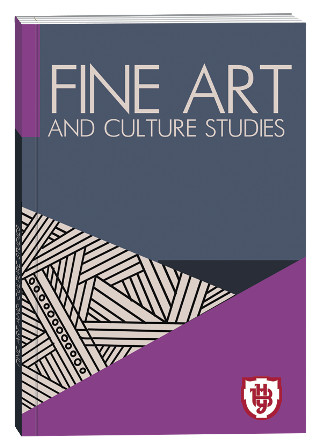METAMORPHOSES OF THE MYTH OF ORPHEUS IN FRENCH OPERETТA (USED ON THE EXAMPLE OF “ORPHEUS IN THE UNDERWORLD” BY J. OFFENBACH)
DOI:
https://doi.org/10.32782/facs-2025-3-1-18Keywords:
operetta, “Orpheus in the Underworld” by J. Offenbach, French musical theater of the mid-19th century, genre, style, Orphic myth, parody, satireAbstract
The study summarizes the content and genre-stylistic features of “Orpheus in the Underworld” by J. Offenbach, whichlaid the foundations for the formation of the typology of French operetta.The purpose of the work – revealing the poetic and intonational uniqueness of J. Offenbach’s operetta “Orpheus in the Underworld” in the context of the evolution of the Orphic myth in French culture and music of the mid-19th century.Methodology of the work. Essential for this work were interdisciplinary, genre-style approaches that contribute tothe identification of the features of the metamorphoses of the myth of Orpheus in French musical and theatrical artof the second half of the 19th century.The scientific novelty of the work is determined by the fact that it is the first in Ukrainian musicology to summarize the content and genre-stylistic specificity of J. Offenbach’s operetta “Orpheus in the Underworld” in the contextof the traditions of French culture of the Second Empire.Conclusions. J. Offenbach’s operetta “Orpheus in the Underworld”, created in 1858, marked not only the floweringof the composer’s creativity, but also the processes of forming the leading typological features of a new musical and theatrical genre, which became one of the bright symbols of French culture of the Second Empire. The basis of the work is a parody of a well-known ancient myth, which in previous eras symbolized the embodiment of the theme of high love, devotion, greatpower of art, spirituality, etc. The defining substantive moment of the analyzed operetta by J. Offenbach is the complete absence of high feelings, love between all the characters of the work, including between Orpheus and Eurydice, whoin every way strive to dissolve their own marriage. The temporary passions of the main characters and representativesof ancient Olympus are more likely to resemble a game of love and a parody of great feelings and are allusively correlatedwith the cultural, historical and socio-political realities of France of the Second Empire. The principle of parody alsoextends to the content indicators of the quotes used in the work from “La Marseillaise” (the rebellion of the gods of Olympus) and K. V. Gluck’s aria “I have lost Eurydice”, which acquire a satirical reinterpretation in the conditions of the metamorphoses of the Orphic myth. The genre and style specificity of “Orpheus in the Underworld” by J. Offenbach is formed at the intersection of various sources, in which the stylization of the Italian Orphic opera of previous eras,the traditions of pastoral Rococo, French comic opera and the popular song and dance layer of French musical culture of the Second Empire are organically combined.
References
Джулай Г. А. Метаморфози образу Орфея у французькій сольній кантаті XVII–XVIII століть. Українська культура: минуле, сучасне, шляхи розвитку. 2022. Вип. 40. С. 25–31.
Єрмоленко В. А. Орфей, Діоніс та мрії про регенерацію: філософсько-літературні сюжети ХІХ ст. Людина в часі (філософські аспекти української літератури ХХ–ХХІ ст.) / упоряд. В. Моренець, М. Ткачук ; наук. ред. В. Моренець ; Нац. ун-т «Києво-Могилянська академія». Київ : Унів. видавництво «Пульсари», 2010. С. 54–75.
Касьянова О. В. Міф про Орфея та Еврідіку в хореографічних інтерпретаціях музичного театру. Часопис НМАУ імені П. І. Чайковського. 2013. № 3. С. 100–106.
Лексикон загального та порівняльного літературознавства / голова ред. А. Волков. Чернівці : Золоті литаври, 2001. 634 с.
Муравська О. В. Образ Орфея в духовно-естетичному просторі німецько-австрійської музичної культури Нового часу. Fine Art and Culture Studies. 2025. Вип. 1. С. 135–143.
Откидач В. М. Музично-театральні жанри розважального спрямування як джерельна база розвитку музичної естради та рок-музики. Культура України. 2011. Вип. 33. С. 268–278.
Сікорська І. Оперета. Українська музична енциклопедія. Київ : ІМФЕ НАНУ, 2016. Т. 4. С. 463–469.
Штирбул В. Ю. Образ Орфея в мистецтві як модель, що породжує дійсність. Вісник Національної академії керівних кадрів культури і мистецтв. 2023. № 1. С. 337–342.
Böhme Robert. Orpheus: der Sänger und seine Zeit. Bern : Francke, 1970. 576 р.
Faris A. Jacques Offenbach. London : Faber and Faber, 1980. 275 p.
Friedman J. B. Orpheus in the Middle Ages. Cambridge, Mass. : Harvard University Press, 1970. 267 p.
Harding J. Jacques Offenbach: A Biography. London : Published by John Calder, 1980. 274 p.
Kracauer S. Jacques Offenbach und das Paris seiner Zeit. Published by Amsterdam de Lange, 1937. 480 s.
Maneglier Hervé. Paris Impérial – La vie quotidienne sous le Second Empire. Paris : Armand Colin, 1990. 311 s.
Orpheus in the Underworld. URL: https://en.wikipedia.org/wiki/Orpheus_in_the_Underworld (дата звернення: 01.02.2025).
Orpheus. The Metamorphoses of a Myth. Toronto : University of Toronto Press, 1982. 238 p.
Pourvoyeur R. Offenbach. Points, 1994. 256 p.
Traubner R. Operetta: A Theatrical History. Publisher Routledge, 2003. 502 p.
Yon Jean-Claude. Jacques Offenbach. Paris : Gallimard, 2000. 796 p.








